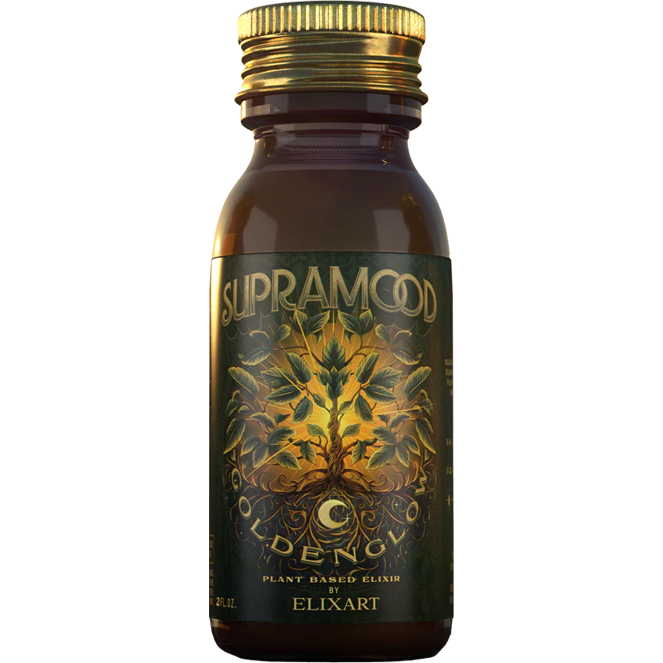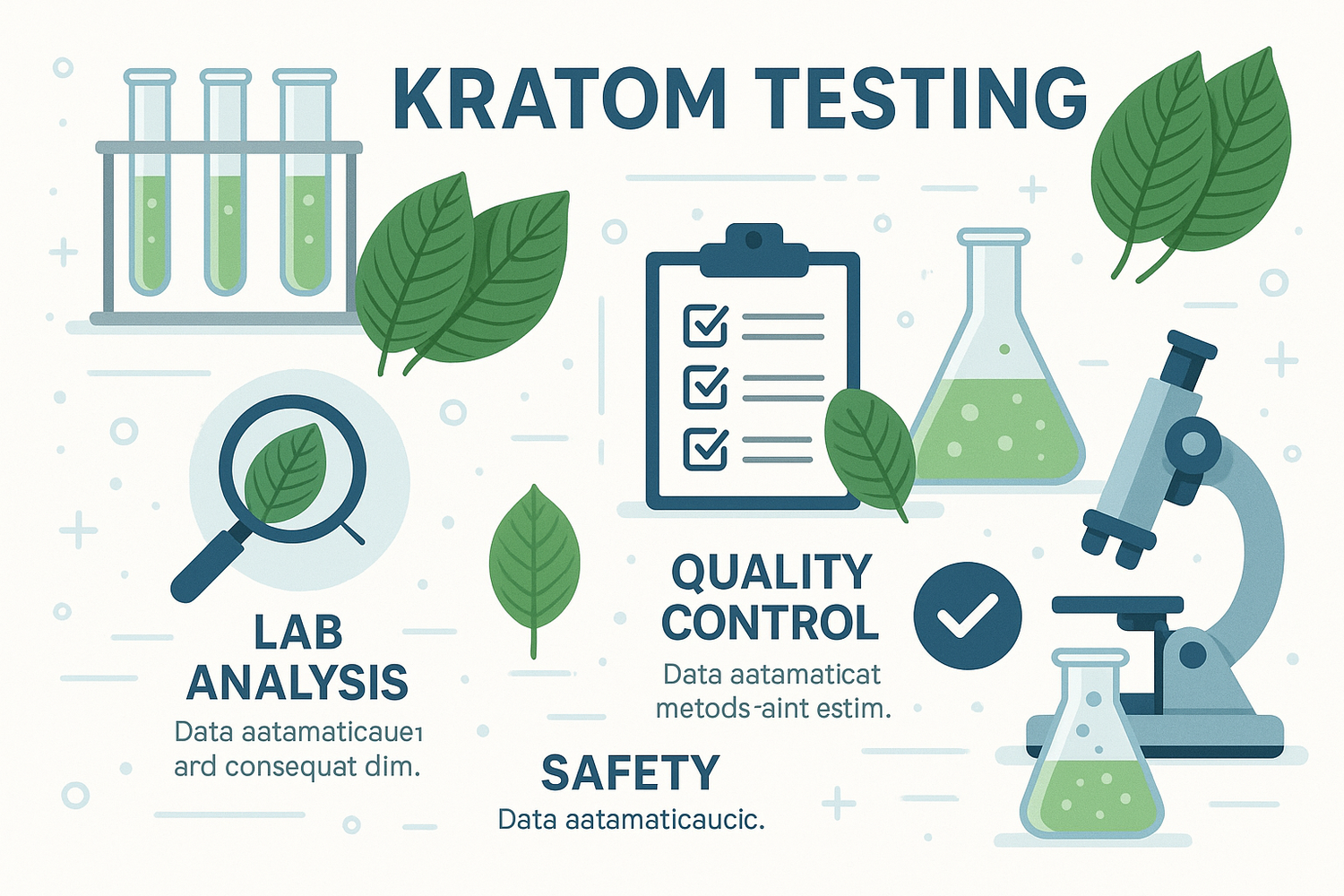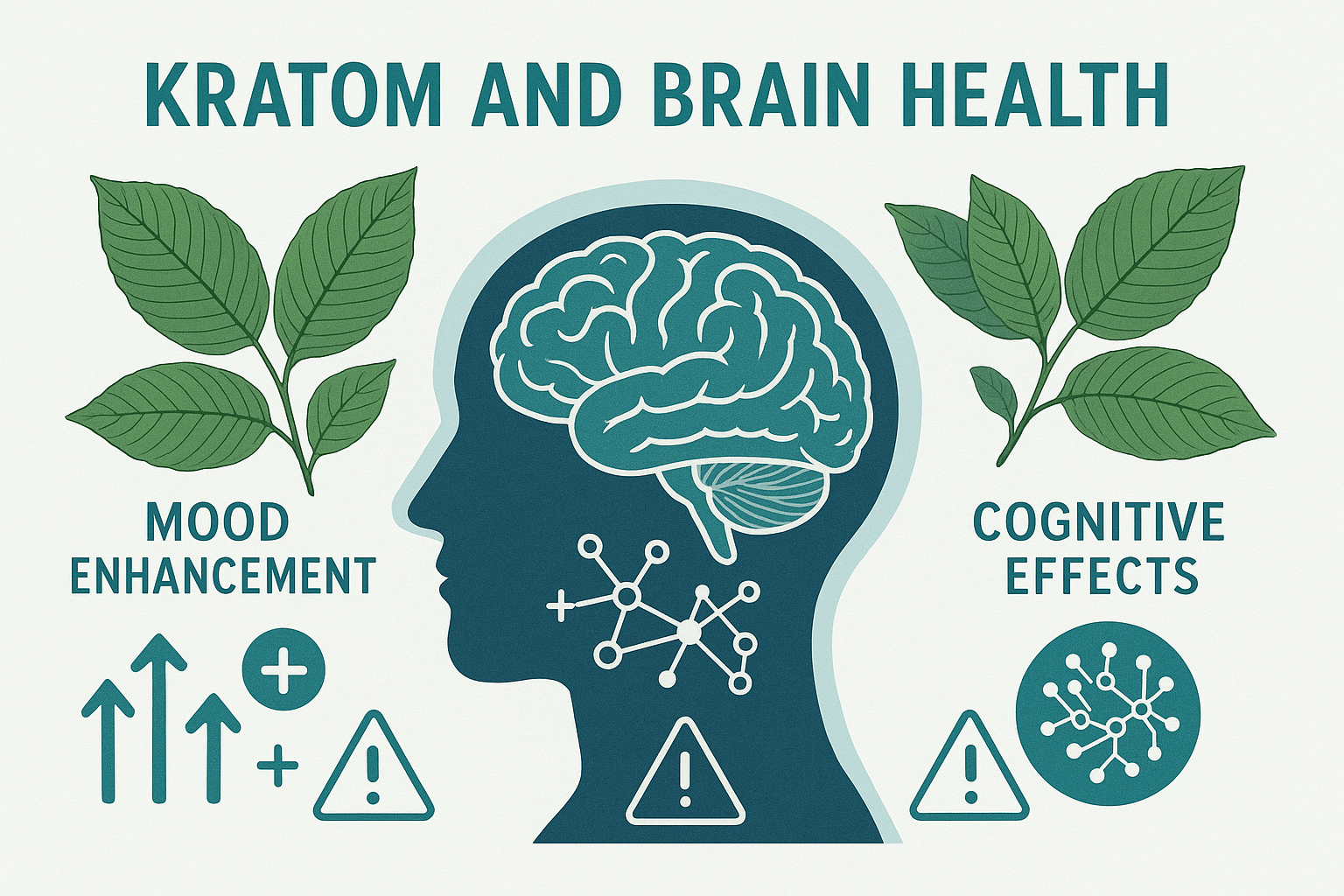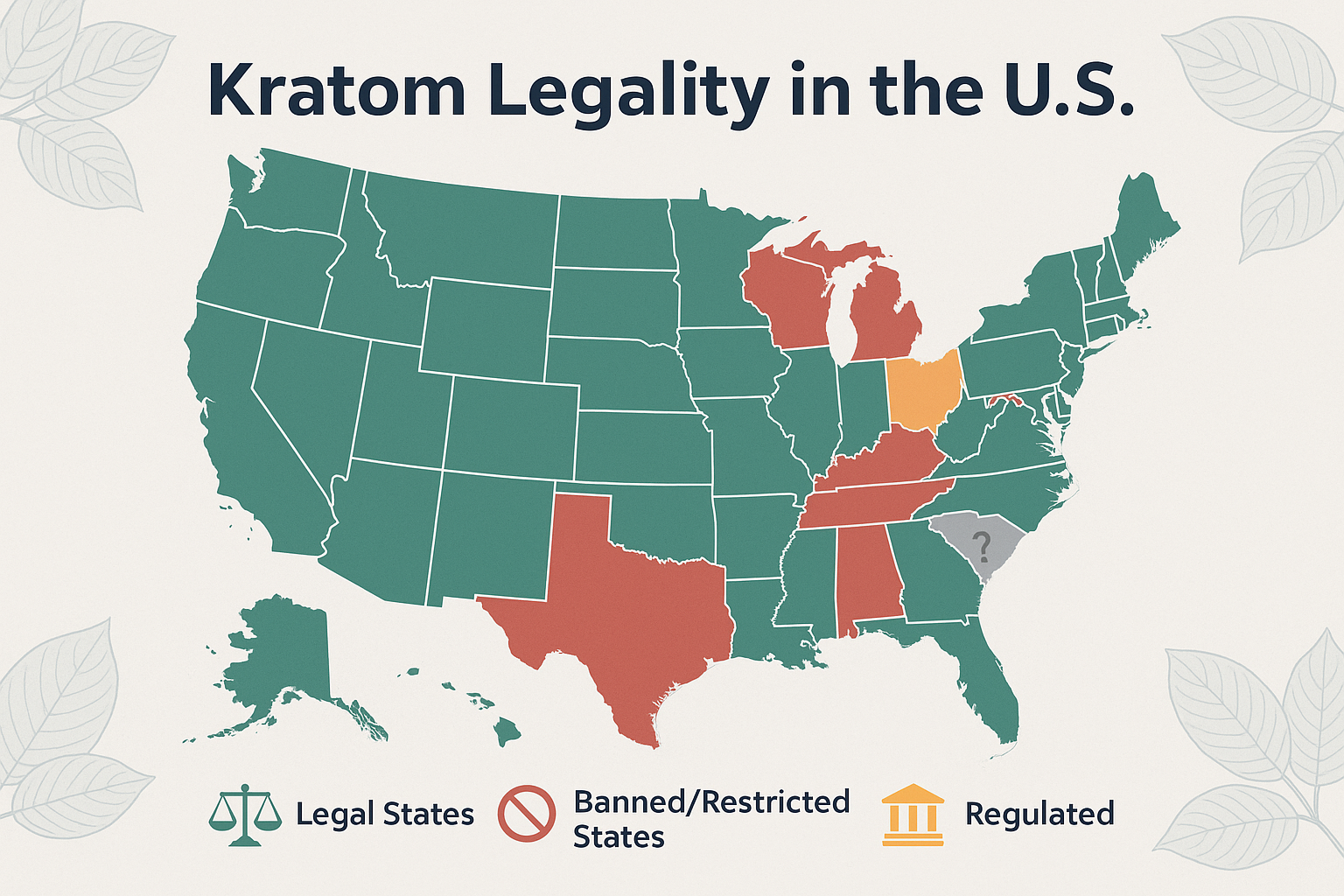Table of Contents
- Introduction to Kratom Drug Testing
- Key Takeaways
-
What Type of Drug Is Kratom?
3.1 What Drug Class Is Kratom?
3.2 What Is the Drug Kratom Used For? -
Does Kratom Show Up in Drug Tests?
4.1 Does Kratom Show Up as an Opiate?
4.2 Will Kratom Show Up on a DOT Drug Test?
4.2.1 What Are the 5 Drugs Tested by DOT?
4.3 Can Kratom Be Detected in a Hair Follicle Test?
4.4 Do Any Employers Test for Kratom?
4.5 Does the Government Test for Kratom?
4.6 Why Am I Testing Positive for Kratom? - How Long Does Kratom High Last?
- What Drugs Should You Not Take with Kratom?
- Conclusion
-
FAQs
Introduction to Kratom Drug Testing
Let’s talk kratom. Imagine a green powder or capsule that some say gives you a caffeine-like kick in small doses and a pain-relieving calm in larger ones. That’s kratom, a plant that’s been used for centuries in Southeast Asia and is now finding its way into gyms, wellness blogs, and even opioid recovery discussions in the West. People are calling it a miracle herb, a legal high, and a potential replacement for painkillers. That’s a lot of hype packed into a leaf.
But with popularity comes scrutiny. Whether you’re a commercial driver, a nurse, a construction worker, or someone under federal probation, chances are you’ve wondered: Will this stuff get me in trouble if I have a drug test tomorrow? You’re not alone. The kratom drug test conversation has become a major topic, especially as employers and government agencies begin to dig deeper into what people are consuming.
We’re here to break it all down, what tests may detect kratom, what it means for your job or legal status, how long it sticks around in your system, and what risks come with it.
Key Takeaways
- Kratom is not commonly detected in standard drug tests, but specific kratom drug tests do exist.
- It does not show up as an opiate, though testing inaccuracies can occur.
- The DOT drug test kratom interaction is mostly nonexistent, as kratom isn’t on the official list.
- Some employers and government agencies may test for kratom if they suspect use or have strict policies.
- Kratom’s effects vary, and it can last in your system for 2–7 days or more, depending on several factors.
- It belongs to a unique drug class and can act as a stimulant or sedative.
- Mixing kratom with other substances can be risky, even dangerous.
What Type of Drug Is Kratom?
Kratom is tricky to define. It’s not an opioid, though it acts like one. It’s not a stimulant, though it can feel like one. It’s best described as a plant-based psychoactive substance, with effects that shift depending on your dose.
What Drug Class Is Kratom?
When people ask, “What drug class is kratom?” there isn’t a straight answer.
Scientifically, kratom contains alkaloids that act on the brain’s opioid receptors, but it’s not legally classified as an opioid. The DEA has flirted with scheduling it as a Schedule It drug, but public backlash has kept it in a kind of legal limbo.
So, for now, kratom sits in a gray zone, a psychoactive herb that’s legal in most U.S. states but controversial enough to be flagged by employers and researchers alike.
What Is the Drug Kratom Used For?
Traditionally, kratom was used in rural Southeast Asia by farmers to fight fatigue and boost stamina. In the U.S., it’s taken for all sorts of reasons-chronic pain, mood enhancement, anxiety relief, and even opioid withdrawal. Some users swear by it, calling it life-changing. Others warn about its addictive potential.
Science is still catching up. While some studies suggest benefits, the FDA has issued warnings, and seizures due to contamination or misuse have made headlines. So, tread carefully, and always source responsibly.
Does Kratom Show Up in Drug Tests?
Here’s the deal: when most people get called in for a drug test, whether it's for a job or a court requirement, they’re usually facing a standard 5-panel drug test. This test screens for substances that are commonly abused: marijuana, cocaine, opiates, amphetamines, and PCP. Kratom doesn’t make the cut, at least not in most cases.
However, just because it’s not in the standard lineup doesn’t mean you’re totally in the clear. There are drug tests out there that are specifically designed to detect kratom, and these can pick up its primary active alkaloids, mitragynine and 7-hydroxymitragynine. The catch? These aren’t widely used unless there’s a specific reason to suspect kratom use.
Does Kratom Show Up as an Opiate?
No, Kratom does not typically show as an opiate. But, and this is a big but, there have been reports of false positives due to cross-reactivity in certain immunoassay tests. That means you might test positive for an opioid like methadone when you’ve only taken kratom.
Now, this is where a lot of people get confused. Kratom can feel like an opioid at higher doses; it binds to the same mu-opioid receptors in the brain, but chemically, it’s different.
If that ever happens, make sure you request a GC/MS confirmatory test. It’s more accurate and will tell the lab what’s really in your system.
Will Kratom Show Up on a DOT Drug Test?
Alright, now let’s talk about the DOT drug test kratom scenario. If you’re a truck driver, airline pilot, or anyone working in a safety-sensitive position regulated by the Department of Transportation, you’re probably getting tested more rigorously than the average office worker.
The good news? As of right now, kratom is not included in the DOT’s required testing protocols. So, even if you take kratom before your test, unless your employer adds a specialized kratom panel, you’re unlikely to have a problem.
What Are the 5 Drugs Tested by DOT?
For clarity, the DOT’s standard 5-panel drug test screens for the following substances:
- Marijuana (THC)
- Cocaine
- Amphetamines (including meth)
- Opiates (like heroin and morphine)
- PCP (Phencyclidine)
- So, if you’re worried about a 5-panel drug test, kratom detection, relax. Kratom’s not on the list, at least not yet.
Can Kratom Be Detected in a Hair Follicle Test?
Hair follicle tests are known for their ability to detect drug use over a long window, sometimes up to 90 days. But here’s the twist: unless the lab is specifically looking for kratom, it won’t show up. The alkaloids in kratom can be present in your hair, but if the test isn’t designed to find them, they’ll be ignored.
Some specialized labs may offer kratom detection through hair testing, but it’s rare and expensive. Most employers won’t go that far, unless they have a reason to.
Do Any Employers Test for Kratom?
Yes, some do, but they’re the exception, not the rule. Employers in healthcare, transportation, aviation, and public safety may include kratom in extended drug panels. Why? Because in these fields, even mild sedation or stimulation can create dangerous situations. If an employer is concerned about your alertness, judgment, or reliability, they might opt for a kratom-specific screen. If you’re unsure, check your company’s drug policy or ask HR. Better to be informed than blindsided.
Does the Government Test for Kratom?
When it comes to government drug testing, it depends on the agency and the role. In general, kratom is not included in most federal drug testing protocols. However, there have been instances in military, probation, or court-supervised cases where special kratom testing was ordered.
So yes, the government can test for kratom, but they don’t always do it.
Why Am I Testing Positive for Kratom?
If your test unexpectedly flags kratom, you might be wondering what the heck happened. There are a few possibilities. Maybe your test was actually looking for kratom. Maybe your kratom use triggered a false positive for an opioid or another drug. Or just maybe, there was a lab error or sample contamination.
Either way, don’t panic. Follow up with the testing facility, ask for a detailed report, and request a confirmatory test if needed.
How Long Does Kratom High Last?
Kratom isn’t one-size-fits-all. The onset of effects usually kicks in within 10 to 20 minutes after consumption. At lower doses, you’ll feel more alert and focused. At higher doses, the sedative effects take over. The “high” typically lasts 2 to 6 hours, but it can vary depending on your dosage, strain, and personal metabolism.
As for how long it stays in your system? Most people will test negative within 2 to 7 days, but heavy users might carry detectable levels for longer. Things like body fat, liver function, hydration, and age all play a role.
What Drugs Should You Not Take with Kratom?
This is where things get serious. Mixing kratom with other substances can be dangerous, sometimes fatal.
You should never combine kratom with:
Alcohol:
The risk of respiratory depression and overdose skyrockets.
Benzodiazepines or opioids:
Both are sedatives, and too much suppression can stop your breathing.
Stimulants like Adderall or cocaine:
These can raise your heart rate, blood pressure, and anxiety.
Certain antidepressants and mood stabilizers:
They can result in serotonin syndrome or liver issues.
The liver processes kratom, so any medication that also uses the same enzymes (like CYP3A4 or CYP2D6) can increase the risk of side effects. If you’re on prescriptions, talk to a doctor before adding kratom into the mix.
Conclusion
Kratom is a fascinating, complex, and often misunderstood substance. While it’s natural and legal in many places, that doesn’t mean it’s free of risks, especially when it comes to drug testing. If you're navigating employment, legal requirements, or simply curious about how kratom affects your body, it’s crucial to stay informed.
It might not show up on a standard kratom drug test, but specialized tests are out there. And as the legal and scientific landscape evolves, so might the testing protocols. Whether you use kratom for relief, focus, or recovery, your best defense is knowledge, transparency, and caution.
Frequently Asked Questions (FAQs)
Does kratom show up in blood tests?
Yes, if the blood test is designed for Kratom. Blood tests can detect it within 24 hours of use.
Is kratom an opioid?
No, but Kratom acts on opioid receptors and has opioid-like effects.
What type of drug is kratom?
Kratom is a plant-based psychoactive drug with stimulant or sedative effects.
What category is kratom in?
Currently unscheduled at the federal level, often considered an herbal supplement or substance of concern. Scientifically, kratom contains alkaloids that act on the brain’s opioid receptors, but it’s not legally classified as an opioid
Can kratom be detected in blood or saliva tests?
Yes, kratom be detected in blood or saliva tests but only with specialized tests targeting mitragynine.
What class of chemical is kratom?
Kratom contains alkaloids, primarily mitragynine and 7-hydroxymitragynine.
How do I detox kratom from my body before a drug test?
Stay hydrated, exercise, and give yourself a week off for safety.
Is there a specific test to detect kratom?
Yes, targeted urine or blood tests exist to detect Kratom, but they’re not common.
How long should I stop taking kratom before a drug test?
Aim for 5 to 7 days minimum before taking a Kratom drug test, depending on your usage and metabolism.







Leave a comment
All comments are moderated before being published.
This site is protected by hCaptcha and the hCaptcha Privacy Policy and Terms of Service apply.